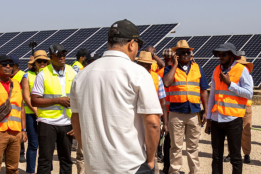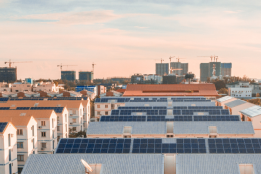Technology is crucial to solving many of the world’s toughest climate challenges. In developing countries across Asia, women have big, promising ideas—but the climate technology sector, or “climate tech”, like the wider technology sector, is heavily male-dominated.
Many Asian countries are ahead of the world in terms of women earning science, technology, engineering, and mathematics (STEM) degrees, but they are still far outnumbered by men. The differences are particularly pronounced at the top: A recent study of six Southeast Asian countries, for example, found only 23 percent of senior leaders—and 8 percent of technical leaders—in the 50 biggest technology companies were female.
This is why the Climate Investment Funds (CIF) and the Asian Development Bank explicitly prioritize gender and social inclusion in a range of climate tech projects.
The $20 million initial investment through CIF’s Clean Technology Fund (CTF) and additional funding from ADB, provided “patient” capital to startups developing technology-enabled climate and sustainability solutions with the potential to be scaled up across emerging Asia.
“Women climate tech innovators in Asia are showing how much they can achieve when they have access to capital and support networks,” said Nina Kolybashkina who leads CIF’s Gender and Social Inclusion work.
“This is why CTF is such a critical source of finance. We are proud to have provided the initial capital these startups needed and look forward to contributing to many more climate tech successes led by women around the world.”
The investments are designed to attract additional capital; with over 80 percent expected to deliver significant climate mitigation and/or adaptation impact, and 75 percent anticipated to demonstrate strong female participation in either market engagement or management roles.
“Investing in women isn’t just about equality—it makes for smart business,” said Jugnu Pati, Senior Fund Manager at ADB Ventures, the fund that cofinanced. “We are fiercely committed to breaking down the barriers that hold women back from achieving more and providing the capital and support that female innovators need to thrive.”
Nicole Mao is the co-founder and Chief Executive Officer of Tiger New Energy, a company that supports the clean energy transition in Bangladesh by connecting EV rickshaw drivers to battery-swapping stations, in addition to training women to become rickshaw drivers. When asked what quality one should have to succeed in the world of climate tech, she said:
“Resilience! We heard a lot of “nos” along our way. We never gave up on the EV vision of making a green transition affordable by offering battery as a service. With resilience we can turn ‘no” into yes”!
Gender bias often hinders the growth of female-led startups, as women face skepticism when pitching their ideas. Many women also lack access to the networks they need to obtain financing and develop successful businesses. Yet in tech hubs across the region, there has been a surge in female entrepreneurship. Governments are also promoting gender diversity in the sector and offering incentives to inspire more women to pursue STEM careers.
A wide array of innovation
Here are a few snapshots of some of the innovators and the projects they developed:
Tiger New Energy: Co-founded by two women, Nicole Mao and Yiwei Zhu, Tiger New Energy is supporting clean mobility in Bangladesh by combining high-quality and durable batteries for electric rickshaws with a network of battery-swapping stations. This reduces range anxiety and enables drivers to quickly swap out their batteries and get back to work, increasing their earnings by at least 30 percent. The company has also prioritized women’s empowerment, launching the “Her Driver” project, which offers training and financial assistance to enable more women to become rickshaw drivers. The goal is to increase female participation in the company’s network by 25 percent by 2025.
Watch Nicole Mao explain:
KrossLinker: Founded by three scientists in Singapore, two of whom are women, KrossLinker makes a variety of aerogel-based thermal insulation products. Its vision was to drastically reduce energy consumption by making advanced insulation materials affordable and accessible. Its cold chain packaging solutions for pharmaceuticals, for example, enable the safe and effective transportation of temperature-sensitive vaccines and drugs with less energy use for refrigeration.
“We’re leading a revolution in insulation, combining performance with sustainability,” said CEO and co-founder Dr. Gayathri Natarajan. “Every industry that adopts our technology is taking a significant step towards a more energy-efficient future.”
IBISA: Co-founded by Maria Mateo Iborra, IBISA designs index-based insurance solutions to cater the customers exposed to climate change- and weather-related risks such as extreme rain, cyclones, heatwaves, and droughts. Its platform assesses risks in a given location, guides customers in setting appropriate triggers or thresholds, and then monitors conditions in real-time, automatically processing claims when an event occurs. The company thus helps to provide a safety net for vulnerable food producers while contributing to a more financially resilient agricultural sector in the face of climate change.
Watch Maria Mareo Iborra explain:
Intensel: Founded by Dr. Entela Benz, Intensel uses big data and enhanced artificial intelligence to help financial institutions, real estate firms, and other companies understand and address climate risks. The company applies dynamic climate modeling across multiple scenarios and time horizons to analyze acute and chronic hazard exposure, layered with socioeconomic data to quantify the financial value at risk. The company’s high-resolution climate risk analytics assess the impact of hazards such as rainfall floods, storm surges, typhoons, and sea level rise, for instance, to help clients make climate-informed risk mitigation, resilience planning, and capital allocation decisions.
UniFAHS: Founded by women scientists, UniFAHS is a pioneer in the application of phage technology—bacteria-fighting viruses—to help ensure safe and sustainable food production and combat the global challenge of antimicrobial resistance (AMR). “Our goal is to set new standards in agriculture and food safety, ensuring a healthier future for all,” said co-founder and CEO Dr. Kitiya Vongkamjan. The company owns phages targeting major pathogens that contaminate food during processing, as well as phages that can be blended into animal feed to reduce risks associated with poultry, pork, and seafood, for instance.
Looking ahead
These women entrepreneurs are not only shattering glass ceilings but also helping to pave the way for future generations of female innovators. Much more remains to be done, however; continued progress requires concerted efforts from policymakers, investors, and the technology community, more broadly.




